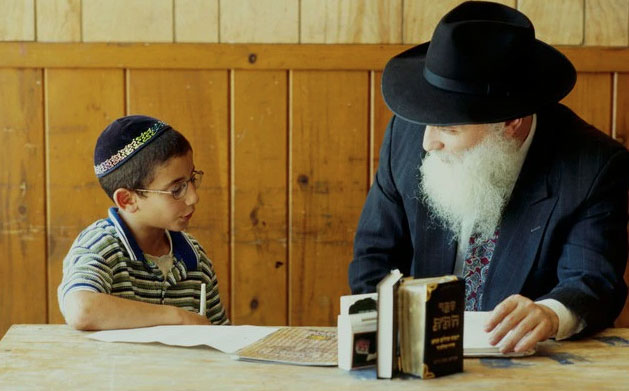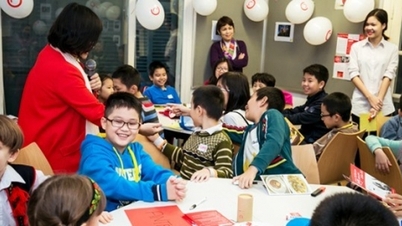A Jewish child psychologist said: " A child with poor communication skills has more shortcomings than a child who has never set foot in a university." A child who is overly pampered and protected by his parents will have difficulty integrating into society.
He will encounter many problems such as: not knowing how to communicate and cooperate with others, even when looking for a job, he does not know how to promote his personal image, because he only knows how to behave in a narrow scope, which is the family, and does not know how to treat people in society.
Training children in communication skills is not as simple as pushing them out into society. Not intervening in their conflicts does not mean we sit idly by and let them do whatever they want.
From the first day of birth, children have begun social communication activities, their first communication objects are us, their parents.
How we communicate with our children is how they will communicate with others. How we handle conflicts between parents and children is how our children will handle conflicts between themselves and others. From this perspective, we are teachers who train our children in communication skills and are models for their communication behavior.

Ineducating their children, Jews always have more practical and "stronger" measures than other parents. Illustrative photo
The Jewish method of educating children to build social relationships is also worth our reference.
According to them, in order to foster communication skills for children, parents must have a long-term vision. If parents only think: "My child is too young, it is not necessary to make demands on him in this aspect", then it is their negligence, or in other words, parents do not fulfill their duties. By the time their children develop stubbornness in their personality, it will be too late for parents to correct them.
Therefore, parents themselves must soon outline a good plan and implement it effectively, training their children's communication skills even more.
Israeli parents absolutely do not "imprison" their children, do not stand up for them. Before their children realize they should leave their parents, they will proactively leave them first, encourage their children to leave home, overcome their inferiority complex, learn to communicate with others, and move towards the wonderful world outside.
To do that, Jewish parents always adhere to the following principles when teaching their children to communicate:
Have faith in your child's abilities
Professor Reuven Feuerstein - world famous cognitive psychologist in the research "Intelligence can be modified" rejected the idea that intelligence is fixed, he said: every child becomes smarter through the way they learn.
Therefore, Jewish parents always have a strong belief that every child is intelligent. Their belief will create positive energy for their children. Then, children also believe that they are capable of doing it.
To help children maximize their intelligence, Jews have principles so that children can experience and explore for themselves to help increase neural connections such as: Do not do things for children; do not prevent children from thinking and developing ideas, always try your best to help children realize the ideas that come to their heads, help children believe in their own initiatives and carry them out at all costs, never label children as "stupid", "useless" or "dumb".
let go
A Jewish child is expected to be independent by the age of 18. This is related to the "hands-off" approach adopted by Jewish parents.
In their parenting style, volunteer Jewish parents only do well at 80 points. They intentionally leave some problems for their children to face and solve on their own.
Jewish parents believe that raising children is like planting flowers, one must patiently wait for the flowers to bloom. This slowness is not slow in terms of time, but the patience of the parents.
Parents should not criticize children for their temporary behavior, do not solve the big and small problems that children encounter for them, give them the opportunity to solve them themselves. "Do not use parental love to control and confine children."
Even when children make mistakes, parents should not intervene because they will learn more from failures. This way, children will remember longer, be more creative in their decision-making process and take responsibility.
Thanks to the above method, Jewish children always have a high sense of responsibility, are always satisfied in everything and have a greater chance of success.
The most precious parental love is to let children become independent individuals as soon as possible, separate from their own lives and face the world with an independent personality. The sooner you withdraw and let go, the easier it is for your children to adapt to the future.

A Jewish child, when he turns 18, is expected to be independent. This is related to the "hands-off" method of education of Jewish parents. Illustration photo
Active communication
In his famous theory of "mediated learning experiences", Professor Reuven Feuerstein emphasized the indispensable role of the mediator (parents) in helping to develop children's intelligence.
Because, when children learn or when solving problems, it is the quality of the interaction between parents and children that promotes and stimulates the development of maximum intellectual potential in children.
Professor Feuerstein emphasized: a child's intelligence is limitless and expands at will; how much it expands depends on how the parents create it.
To do this, when teaching children, as intermediaries, parents should: Ask questions to encourage children to think and give their opinions; Encourage children to express what they have just learned according to their thoughts; Always ask children how they feel about an activity or game they have just participated in; Suggest that children think logically about a certain issue.
Source: https://giadinh.suckhoedoisong.vn/doc-cac-nguyen-tac-giao-tiep-nguoi-do-thai-day-con-moi-thay-vi-sao-tre-em-nuoc-nay-lon-len-gioi-giang-hanh-phuc-172240926162338734.htm





![[Photo] Readers line up to visit the photo exhibition and receive a special publication commemorating the 135th birthday of President Ho Chi Minh at Nhan Dan Newspaper](https://vphoto.vietnam.vn/thumb/1200x675/vietnam/resource/IMAGE/2025/5/17/85b3197fc6bd43e6a9ee4db15101005b)
![[Photo] Prime Minister Pham Minh Chinh chairs meeting on science and technology development](https://vphoto.vietnam.vn/thumb/1200x675/vietnam/resource/IMAGE/2025/5/17/ae80dd74c384439789b12013c738a045)
![[Photo] More than 17,000 candidates participate in the 2025 SPT Competency Assessment Test of Hanoi National University of Education](https://vphoto.vietnam.vn/thumb/1200x675/vietnam/resource/IMAGE/2025/5/17/e538d9a1636c407cbb211b314e6303fd)





























![[Photo] Nearly 3,000 students moved by stories about soldiers](https://vphoto.vietnam.vn/thumb/1200x675/vietnam/resource/IMAGE/2025/5/17/21da57c8241e42438b423eaa37215e0e)






































































Comment (0)